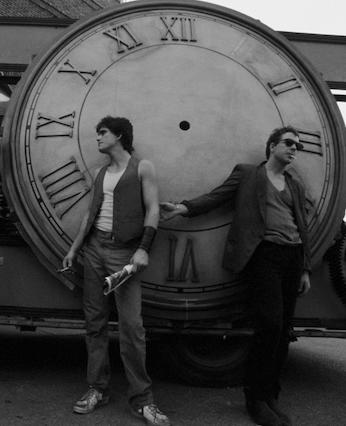Sunday, October 30, 1983
RUMBLE FISH. Co-written by Susan E. Hinton, based on her 1975 novel. Music by Stewart Copeland. Co-written and directed by Francis Coppola. Running time: 94 minutes. Rated 14 years entertainment with the B.C. Classifier’s warning: frequent very coarse language, some violence, occasional nudity and suggestive scenes.
"HEY, HEY, HEY, HEY, hey, hey," says The Motorcycle Boy (Mickey Rourke) in an attempt to communicate with his younger brother Rusty-James (Matt Dillon). "Hey" is the third most frequently used word in the screen adaptation of Susan E. Hinton's novel Rumble Fish.
The second most frequently used word is "man," as in "hey, man," "y'know, man," and "what's happenin', man?" The word heard most frequently can't be quoted here, but it too is a monosyllable, one that has the same initial letter as director Francis Coppola's Christian name.
Coppola, an Oscar winner for his work on the scripts of Patton, The Godfather and The Godfather: Part II, has written better things. In attempting to capture the feeling of a teenager's frustration, he has produced an incoherent, utterly unappealing film.
No, it's worse than that. Rumble Fish, the least commercial picture Coppola has ever done, is a work of such stupefying emptiness that it staggers the imagination.
His overall approach is valid enough. Faced with the task of adapting a novel to the screen, he attempts to enter the mind of its central character and visually reflect what he finds there.
What he should have realized was that Rusty-James's shrivelled consciousness wasn't worth the bother. A teenaged mediocrity, he is a kid who was raised by his alcoholic Old Man (Dennis Hopper), and who is in awe of his more accomplished older brother, a former street-gang leader and mental defective known to one and all as The Motorcycle Boy.
Burrowing into Rusty-James's brain was like returning to film school for Coppola. Unformed and essentially stupid, it is the sort of mind that throws up all of the cliché images beloved by cinema students.
Speeded up clouds show us his restlessness; repeated closeups of billiard balls shot from extreme angles symbolize his self-absorption and macho pretensions; making the movie in black-and-white with occasional splashes of colour emphasizes his monochromatic worldview.
Rusty-James is a teenaged turkey, a dull, resentment-driven dimbulb looking for someplace to burn out. His story, far from being insightful, is just plain boring.
Coppola knows this because he shows this. The only real question is why he chose to waste his time and ours with nonsense like Rumble Fish.
The above is a restored version of a Province review by Michael Walsh originally published in 1983. For additional information on this archived material, please visit my FAQ.
Afterword: I had already noted my disappointment with 1983’s The Outsiders, the director’s first adaptation of an S.E. Hinton novel. Twenty-five weeks later, Rumble Fish arrived in town and prompted the above rant, the least favourable review I’ve ever given to a Coppola film. At the time, critical response to the picture was all over the map. When audiences stayed away in droves, it became a boxoffice disaster.
In retrospect, I might have made more of the picture’s politics. I did note that it was in black and white, but failed to follow up on the fact that, stylistically, it was an homage to German expressionism, the dark film movement that foreshadowed the rise of Nazism in the interwar period. Though not an overtly political filmmaker, Coppola was a political person. In 1980, he’d worked on socially progressive California Governor Jerry Brown’s campaign for the Democratic Party’s presidential nomination. That was the year that U.S. voters chose former California Governor (and corporate spokesmodel) Ronald Reagan to lead the nation.
Was Rumble Fish the cinema artist’s reaction to an historic moment when America was shifting to the right? The press notes that accompanied the film’s release didn’t say, and Coppola was famous for not explaining himself. Following the 1979 New York press screening of Apocalypse Now, I heard him tell a room full of journalists: "My movie is my opinion . . . Whatever you take away, that's what you take away." In 2005, the prestige Criterion Collection added his Rumble Fish film to its list of DVD releases in a package chock-a-block with extras that included audio commentary by the director.
Today’s package: The five Francis Coppola features we’re adding to the Reeling Back archive are his 1982 modern musical One from the Heart, his two teen dramas, The Outsiders and Rumble Fish (both 1983), a period musical The Cotton Club (1984) and the drama Gardens of Stone (1987).
See also: Already in the archive are Francis Ford Coppola’s The Godfather (1972) and The Godfather: Part II (1974); The Conversation (1974), Apocalypse Now (1979), Peggy Sue Got Married (1986) and The Godfather: Part III (1990). Finally, there is my 1979 interview with the director.
